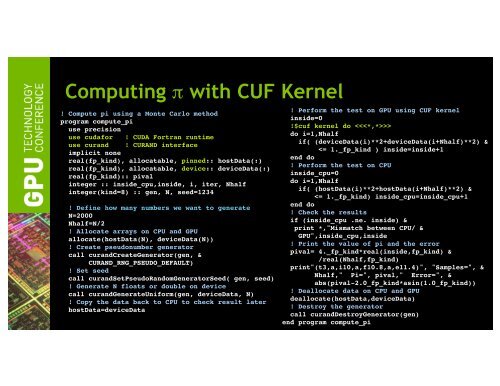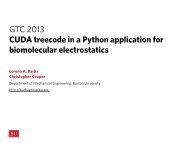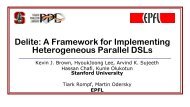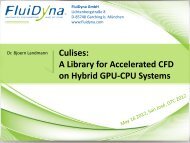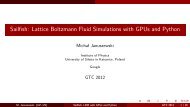Tutorial: Introduction to CUDA Fortran | GTC 2013
Tutorial: Introduction to CUDA Fortran | GTC 2013
Tutorial: Introduction to CUDA Fortran | GTC 2013
Create successful ePaper yourself
Turn your PDF publications into a flip-book with our unique Google optimized e-Paper software.
Computing π with CUF Kernel<br />
! Compute pi using a Monte Carlo method<br />
program compute_pi<br />
use precision<br />
use cudafor ! <strong>CUDA</strong> <strong>Fortran</strong> runtime<br />
use curand ! CURAND interface<br />
implicit none<br />
real(fp_kind), allocatable, pinned:: hostData(:)<br />
real(fp_kind), allocatable, device:: deviceData(:)<br />
real(fp_kind):: pival<br />
integer :: inside_cpu,inside, i, iter, Nhalf<br />
integer(kind=8) :: gen, N, seed=1234<br />
! Define how many numbers we want <strong>to</strong> generate<br />
N=2000<br />
Nhalf=N/2<br />
! Allocate arrays on CPU and GPU<br />
allocate(hostData(N), deviceData(N))<br />
! Create pseudonumber genera<strong>to</strong>r<br />
call curandCreateGenera<strong>to</strong>r(gen, &<br />
CURAND_RNG_PSEUDO_DEFAULT)<br />
! Set seed<br />
call curandSetPseudoRandomGenera<strong>to</strong>rSeed( gen, seed)<br />
! Generate N floats or double on device<br />
call curandGenerateUniform(gen, deviceData, N)<br />
! Copy the data back <strong>to</strong> CPU <strong>to</strong> check result later<br />
hostData=deviceData<br />
! Perform the test on GPU using CUF kernel<br />
inside=0<br />
!$cuf kernel do <br />
do i=1,Nhalf<br />
if( (deviceData(i)**2+deviceData(i+Nhalf)**2) &<br />


